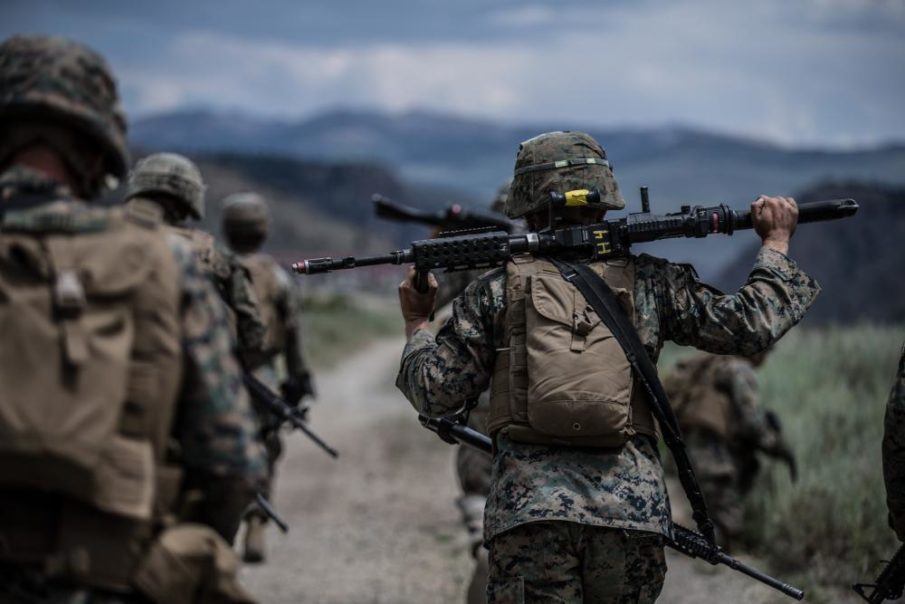In a historic first for the United States Marine Corps, a female Marine has successfully completed the Infantry Officer’s Course and will soon be assigned to an infantry unit, Marine Corps officials announced on Thursday.
The female lieutenant, whose name has not yet been released, completed the final training elements of the IOC alongside her male counterparts at Marine Corps Air Ground Combat Center Twentynine Palms, California on Wednesday, and now faces only a few days of gear return and administrative processing before she becomes the first ever female Marine Corps Infantry Officer.
Although this young woman is the first to successfully complete the 13-week Infantry Officer’s Course, she is not the first to attempt it. In all, more than 30 women have tried to finish the intensive combat oriented training, which can be reached only after completing Officer Candidate School (effectively boot camp for officers) and then the grueling six month Basic Officer Course. The Basic School has been a coed program for years, not unlike Marine Corps Combat Training for non-infantry enlisted Marines. Women were not permitted to attempt to complete the Infantry Officer Course after completion of the Basic School, however, until 2012. The courses were closed again to females in 2015, before being reopened at the end of that year.
The first female Marine Infantry Officer will participate in the course’s graduation ceremony scheduled for Monday before executing orders to her first duty station.
The Marine Corps has historically been the most male dominated branch of the U.S. Armed Forces, which, thanks to things like the recent public embarrassment at the hands of current and former Marines under the guise of a Facebook group called “Marines United,” has faced a great deal of scrutiny in recent months about the way female Marines are perceived and treated by their male counterparts. Concerns about cohabitation in tents, for instance, rippled through the Corps and into the media, with most falling into one of two camps: those who believe women aren’t suited for the rigors of combat, and those who are willing to let the performance of the female Marines speak for themselves.
Approximately a fourth of all Marines who attempt to complete the Infantry Officer’s Course, renown as among the toughest training rotations for conventional war fighters, wash out and end up reclassed into other occupational specialties around the Corps. An average of ten percent fail on the first day.
The challenge of the Infantry Officer’s Course is not necessarily having to learn new skills, as many of the same lessons taught in The Basic School are again called upon at the IOC. The difference, however, is that candidates are expected to call upon all of those skill sets simultaneously, in stressful situations of often indeterminate length, meaning officers completing the course must learn to utilize their newly honed skills in uncertain and exhausting circumstances. Among those exhausting circumstances are extensive obstacle courses and long distance humps with a 150 pound ruck.
“We’re primarily a foot-mobile organization,” Maj. Scott A. Cuomo, a former director of the Infantry Officer’s Course said. “So you have to be able to carry the equipment you need in the fight. And you have to be able to fight when you get there, and, if you are an officer, you have to be able to think and make decisions in that fight that will influence it in a way that you will win.”
Once in the fleet, the first female Infantry Officer will likely be leading a platoon of as many as 40 enlisted Marines; a daunting task for any officer, let alone the first of her gender. The Marine Corps, under the leadership of Commandant Gen. Robert B. Neller, has been trying to make strides toward acceptance of female Marines in combat roles since being ordered to open all occupational specialties to women in December of 2015, an effort Neller punctuated with a sincere gut check directed at his fellow Marines in the aftermath of the Marines United nude photo sharing scandal.
“I need you to ask yourselves,” he said at the time, “How much more do the females of our Corps have to do to be accepted?”
The challenges of this first female Infantry Officer will likely be compounded by external attention, as she works to win over the loyalty and respect of the Marines in her charge, as any officer must, but with the added pressure of working under the peering eyes of supporters and detractors alike.
Already have an account? Sign In
Two ways to continue to read this article.
Subscribe
$1.99
every 4 weeks
- Unlimited access to all articles
- Support independent journalism
- Ad-free reading experience
Subscribe Now
Recurring Monthly. Cancel Anytime.










COMMENTS